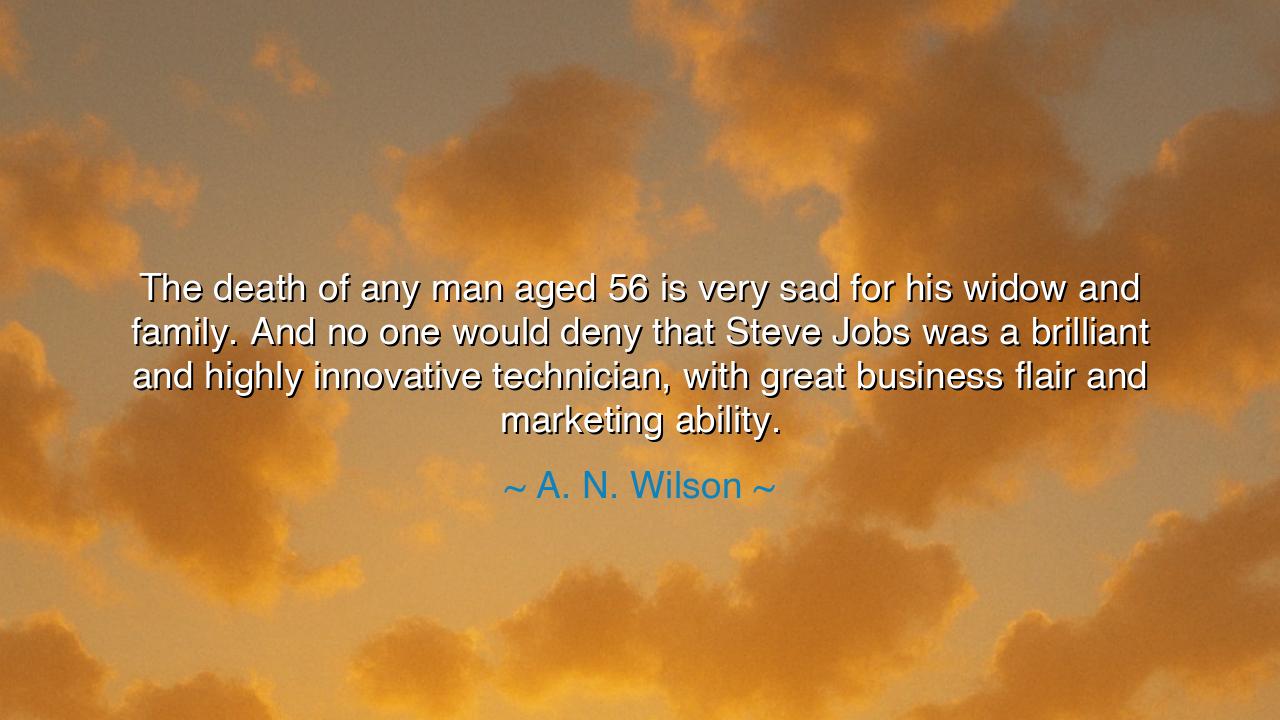
The death of any man aged 56 is very sad for his widow and
The death of any man aged 56 is very sad for his widow and family. And no one would deny that Steve Jobs was a brilliant and highly innovative technician, with great business flair and marketing ability.






The words of A. N. Wilson fall with solemn weight, carrying both grief and sober recognition: “The death of any man aged 56 is very sad for his widow and family. And no one would deny that Steve Jobs was a brilliant and highly innovative technician, with great business flair and marketing ability.” In these lines, Wilson acknowledges two truths: the universal sorrow of death, which tears a husband and father from those he loves, and the particular brilliance of one whose vision reshaped the modern world. It is both a human lament and a public tribute, blending the intimacy of loss with the grandeur of achievement.
The origin of these words rests in the passing of Steve Jobs in 2011. The world mourned the co-founder of Apple, a man who transformed not only technology but the very rhythm of modern life. Yet Wilson’s words remind us that behind the legend lies the mortal, and behind the mortal, a family whose grief is greater than the public’s applause. To speak of his widow and his children is to remind the world that every great figure is first and foremost a son, a husband, a father—woven into the fragile web of human bonds.
The ancients understood this balance between greatness and mortality. Alexander the Great conquered empires, yet at the age of thirty-two, he too fell to death. His soldiers wept not only for their leader but for the man who had marched with them, shared their hardships, and dreamed with them. The grandeur of his victories did not shield his family from grief. So too with Jobs: his innovation, his business flair, his marketing ability will be remembered in history, but for his family, the sorrow is not of legacy but of absence.
History provides another example in Thomas Edison, whose inventions lit the modern world. He lived long, yet his death brought the same lesson: that even the greatest innovators cannot escape the final silence. Edison left a trail of brilliance, but his family’s grief was not lessened by his achievements. The sadness of loss is universal, whether the man is a humble laborer or a titan of industry. Wilson’s words place Jobs within this eternal truth—that genius does not erase mortality, and mortality spares no genius.
There is also a quiet rebuke in Wilson’s tone. In a world eager to turn the death of a great man into myth, he reminds us to pause, to see first the sorrow of those closest to him. Too often, society celebrates the public figure while forgetting the private man. The widow and the family bear the heaviest burden, while the world moves quickly to speak of products, legacies, and empires. True wisdom is to honor both—the achievement that touched millions, and the grief that belongs to a few.
The lesson for us is clear: greatness should never blind us to the humanity behind it. When we speak of the fallen, let us not forget that they leave behind those who grieve, and that the worth of a life cannot be measured only by what was built, sold, or invented. To honor a man fully is to see him in both lights—as a genius whose work shaped the world, and as a mortal whose death brought sorrow to the hearth of his home.
Practical action lies within reach: in your own life, strive for excellence, yes—pursue your craft with passion, build, create, and innovate. But do not neglect the bonds of family, of friendship, of love, for in the end, it is these ties that will mourn your passing. And when others die, whether giants of history or humble neighbors, honor both their contributions and their humanity.
So let us remember A. N. Wilson’s wisdom: the death of any man is sad for his family, yet the brilliance of a life lived well deserves remembrance. In these twin truths we find balance—sorrow for the mortal who is gone, and gratitude for the gifts he left behind. And may we, in our own short years, live so that when death comes, we leave behind both love in the hearts of our families and light in the world we shaped.






AAdministratorAdministrator
Welcome, honored guests. Please leave a comment, we will respond soon